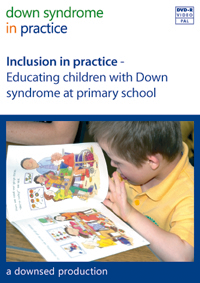Down but not out: a tool for inclusion
A new film offers practical advice and guidance for teachers, classroom assistants and families. Available on DVD, it presents views on classroom practice and effective inclusion, with examples of children at work and at play in UK schools.
Rix, J. (2007) Down but not out: a tool for inclusion. Down Syndrome Research and Practice, 12(1), 42-42. doi:10.3104/resources.2026
My son's reception class teacher wants this DVD back and will pass it on to next year's teacher. Her mum enjoyed watching it, too. And, as a parent of a child with Down syndrome, and as an education academic, I believe it is a very important tool for all school staff and local education authorities.
Children with Down syndrome who are well educated within the mainstream generally perform at two to three years ahead of those in special schools, but if the appropriate attitudes and support are missing, then it is a real struggle for everyone concerned.

As an example, one-third of parents in a recent survey by the Down's Syndrome Association encountered discrimination or prejudice from education professionals. This is largely due to the professionals' lack of personal experience of the issues. As the survey points out, many teachers lack specialist knowledge and skills, along with appropriate materials and information.
This is the comprehensive, accessible resource that so many mainstream schools, parents and local authorities now need. The parents in the DVD express many of the feelings and concerns that I recognise as a parent; the educational psychologists and local authority representatives talk about the key issues I identify with as an academic; and the teachers and teaching assistants explore issues in a way that mean Beverley Hoddell, my son's teacher, can say: "I could really relate to that."
Ironically, there is only one voice missing. No one with Down syndrome tells us what they think. And that, of course, is a criticism to which this review also falls prey.
One of the best things about this DVD was that, as a parent, I heard my son's teacher talking about how it allowed her to see how life could progress - "a view of the future as it might be".
She said the biggest challenge was being open-minded, and this DVD helped her with that, not only acting as a visual reference but broadening the issues beyond any one child. It encouraged her, built her self-confidence, and convinced her that the key principles are in place at her school.
Research
- Down's Syndrome Association (2004) Access to Education: A report on the barriers to education for children with Down's Syndrome, https://www.downs-syndrome.org.uk/pdfs/Access%20to%20Education%20-%20Proof%203.pdf
- Fox S, Farrell P & Davis P (2004) Factors associated with the effective inclusion of primary-aged pupils with Down's Syndrome, British Journal of Special Education
- Rix J, Hall K, with Nind M, Sheehy K, Wearmouth J, (2006) A systematic review of interactions in pedagogical approaches with reported outcomes for the academic and social inclusion of pupils with special educational needs in mainstream classrooms, Research Evidence in Education Library, Institute of Education, University of London; https://eppi.ioe.ac.uk/cms/Default.aspx?tabid=449
It does come with a health warning: it is a bit dry and flat at times, with an over-emphasis on talking heads. As Beverley put it: "Definitely not to be used in one go."
It helps that it is broken down into 10 sections of five to 10 minutes and teachers can dip in and out throughout a year and across a child's time at a school. It is a tool for reviewing and reflecting on practice - useful for a staff development day, or a discussion about issues related to an individual child.
And although it does not go into great detail about all the pedagogies on offer, it contains enough ideas about how to maximise the learning of children with Down syndrome to provide plenty of food for pedagogic thought.
Having watched this DVD, a teacher can't say no one told them what to look out for, and a parent will feel well armed. As Professor Sue Buckley says at the end of the DVD, the biggest challenge is always the attitudes of the staff.
This is the conclusion, too, of a systematic review of more than 3,000 research papers I recently completed for the Training and Development Agency. It is also at the heart of research by Manchester university, which identified the need for teachers to own the process and work closely with all around them.
If we wish children with Down syndrome to be included effectively, we must begin with the views of the professionals at the centre of the process, and this DVD can play an important role.
As Beverley said, it made her realise that "this is an important thing we are doing", and how could I possibly disagree?
Jonathan Rix is a lecturer in curriculum, inclusion and learning at the Open University.
This review was first published in the Times Educational Supplement magazine on the 10 November 2006 and is reproduced with the permission of the publisher.

